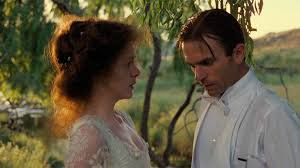Min brillante karriere
It is
entirely fitting that I review “My Brilliant Career” the day after my book
review of “Sense and Sensibility”. Despite taking place a century and half the
globe apart, they are concerned with exactly the same issues. That of gender
politics from women’s point of view.
Around the
turn of the century (1900), Sybylla (Judy Davis) is a daughter of a struggling
farmer family in the Australian outback (or at least rural Australia). Sybylla
is different. She dreams of becoming something, pianist, painter, writer, something
different than farmhand or somebody’s wife. Her parents consider her vastly
egoistic and conceited and in frustration send her off to her grandmother.
Grandma
Bossier (Aileen Britton) is the Aussie version of nobility and hers is a vastly
different world from what Sybylla is used to. This is as Victorian as anything
to be found in Britain and Sybylla feels like a fish on land. Besides learning
good manners, Sybylla is supposed to find a husband. Only that way she can retain
respectability and secure means of living. The idea that Sybylla could make
something of herself on her own is considered outlandish and a fad to grow out
of. The first suitor is a British guest at the manor, Frank Hawdon (Robert
Grubb), a man who considers himself quite a catch and who does not take no for
an answer. The second is Harry Beecham (Sam Neill), a local landowner of the same
social strata as Grandma Bossier. Harry is different and a relation between Harry
and Sybylla blossoms, seriously challenging Sybylla’s ambition of avoiding marriage.
The core of
the story is, again, the narrow scope of prospects allowed for women. As in
Jane Austen’s world, the sole purpose of women is to be married off to a man.
That is her intrinsic value. She can marry into prestige and wealth, but even marriage
in itself, as poorly as the match may be, is necessary in order to be anything.
The alternative is to be a spinster, dependent on family, or utter poverty and
disgrace. The century between Austen and “My Brilliant Career” makes no
difference at all.
Sybylla
dares challenge this system and while we may understand her today (“may” as in,
sadly, not the entire world thinks like that), her contemporaries are
nonplussed and rather confused how to deal with her. Not just the ruling class,
but even the dirt farmers in their squalor subscribe to that attitude.
As a viewer
we are challenged to join that opinion. Do we also consider her conceited and
selfish and unable to compromise? Or do we support her choices? It is not as
easy and simple as it sounds. Sure, there is no way she should marry Frank, and
it is also easy to challenge Bossier’s Victorian views, but would it be too
much to ask for her to assist her struggling family? And why not give in and marry
Harry? It is obvious they love each other.
“My
Brilliant Career” is a beautifully made movie with a wonderful restauration of
rural Australia 120 years ago. Production value is top notch. It is also a
movie with excellent actors performances, especially from Judy Davis, but also
the two matriarchs Bossier and Aunt Gussie (Patricia Kennedy) are wonderful. It
entirely baffling that the only Academy nomination this movie garnered was for
Best costume design. But then, 79 looks to have been a strong year.
I liked “My
Brilliant Career” a lot better than I expected and it does what few movies
succeed to do, challenge its audience. Recommended.

I had the same reaction. Sybylla is such a lovely character in a lot of ways.
ReplyDeleteIn the beginning I was not so certain. It took a little while and effort to see that and that is the effort that at least some of the other characters in the movie is not making.
DeleteI see we are on the same page with this one!
ReplyDeleteWe are indeed.
Delete